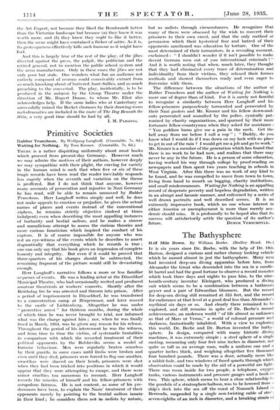Primitive Societies
THERE is a rather dispiriting uniformity about most books which proceed from present-day Germany. However much we may admire the motives of their authors, however deeply we may sympathize with their plight, the craving for variety in the human mind is such that when five or six of these tragic records have been read the reader inevitably responds less eagerly when the seventh sad variation on the theme is proffered. But I do not think that anyone, however many accounts of persecution and injustice in Nazi Germany he has read, will be able to remain unmoved by Rubber Truncheon. Herr Langhoff writes simply and well, he does not make appeals to emotion or prejudice, he gives the actual names of places and events instead of the conventional ciphers, he remains strictly objective (indeed at times indulgent) even when describing the most appalling instances of barbarity and bestial sadism, and he makes a sincere and unmalicious attempt to assess the curious theories and more curious fanaticism which inspired the conduct of his captors. It is of course impossible for anyone who was not an eye-witness of the events which he describes to assert dogmatically that everything which he records is true ; one can only say that his book gives an impression of complete honesty and integrity. But even if it could be proved that three-quarters of his charges should be subtracted, the remaining fragment of the picture would still be devastating enough.
Herr Langhoff's narrative follows a more or less familiar sequence of events. He was a leading actor at the Dfisseldbrf Municipal Theatre, who had occasionally recited and produced amateur theatricals at workers' concerts. Shortly after the Reichstag fire he was arrested and thrown into prison. After a period of imprisonment in Diisseldorf, he was transferred to a concentration camp at Borgermoor, and later moved to the castle of Lichtenburg. Altogether he was under protective arrest " for thirteen months, during the whole of which time he was never brought to trial, nor informed what was the charge against him ; nor, when he was finally freed in March, 1934, was he given any reason for his release. Throughout the period of his internment he was the witness, and from time to time the victim, of systematic brutalities in comparison with which the recorded treatment of their political opponents by the Bolsheviks seems a model of
humane behaviour. Men were regularly beaten senseless by their, guards, in some cases until limbs were broken and
even until they died, prisoners were forced to flog one another, swastikas were shaved on their heads, prisoners were shot when they had been tricked into positions in which it would appear that they were attempting to escape, and there were minor cruelties too numerous to recount. Herr Langhoff records the miseries of himself and his fellow-prisoners with
scrupulous fairness. He is not content, as some of his pre- decessors have been, to explain the Nazis' treatment of their opponents merely by pointing to the bestial sadism innate- in their kind ; he considers them.not: 'as sadists by natuie,
but as sadists through circumstances. He recognizes that many of them were obsessed by the wish to convert their prisoners to their own creed, and that the only method of persuasion which their hysterical fear and hatred of their opponents sanctioned was education by torture. One of the most determined of their tormentors, in a revealing moment, exclaimed : " I shouldn't wonder if it isn't possible to make decent German men out of you international criminals ! " And it is worth noting that when, much later, they thought that they had eliminated every trace of determination and individuality from their victims, they relaxed their former methods and showed themselves ready and even eager to fraternize with them.
The difference between the situations of the author of Rubber Truncheon and the author of Waiting for Nothing is more one of degree-than of kind. For it is surely not fanciful to recognize a similarity between Herr Langhoff and his fellow-prisoners purposelessly tormented and persecuted by their Nazi gaolers and Mr. Kroner and his fellow down-and- outs persecuted and assaulted by the police, cynically pat- ronized by charity organizations, and spurned by their more fortunate fellow-countrymen when they asked for assistance : " You goddam bums give me a pain in the neck. Get the hell away from me before I call a cop " ; " Buddy, do you know what I would do if I was down on my luck with no place to get in out of the rain ? I would get me a job and go to work." Mr. Kroner is a member of the generation which has found that there is no work to be had now, and realizes that there may never be any in the future. He is a person of some education, having worked his way through college by proof-reading on newspapers and then spent two years teaching in schools in West Virginia. After this there was no work of any kind to be found, and he was compelled to move from town to town, living from hand to mouth on begging, charity institutions, and small misdemeanours. Waiting for Nothing is an appalling record of desperate poverty and hopeless degradation, written in an abrupt and laconic manner, and enlivened by a series of well drawn portraits and well described scenes. It is an extremely impressive book, which no one whose interest in either America or unemployment is more than merely aca- demic should miss. It is profoundly to be hoped also that its success will satisfactorily settle the question of its author's






































 Previous page
Previous page